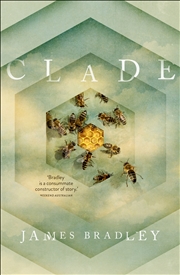 This is a clever, low-key speculative fiction novel where, when the disasters come (climate change, plague), they are normalised into the lives of the characters. If you’ve lived long enough like me, you’ve seen this happen yourself. When I was a child it was inconceivable that animals like tigers or koalas might become endangered, inconceivable that every square inch of the world might be touched by humans – yet here we are.
This is a clever, low-key speculative fiction novel where, when the disasters come (climate change, plague), they are normalised into the lives of the characters. If you’ve lived long enough like me, you’ve seen this happen yourself. When I was a child it was inconceivable that animals like tigers or koalas might become endangered, inconceivable that every square inch of the world might be touched by humans – yet here we are.
Clade starts at about our own time with a young scientist, Adam, in Antarctica observing the vanishing sea ice. Adam’s partner, Ellie, is back in Sydney waiting to hear if her IVF treatment has been successful. This family, in a way, is the genetic code running through the book, the stories like the moments of mutation that shift along biology. Bradley doesn’t give us a comfortable narrative arc, but rather a series of linked stories exploring aspects of our possible future that concentrate on human relations – husband and wife, father and daughter, grandfather and grandson, against a backdrop of floods, plague, migration upheavals, repression, all seen through reality as well as the plethora of ‘screens’ and ‘overlays’ pumping out ‘feeds’. Clade, in its structure, reminded me of Elizabeth Strout’s Olive Kitteridge in the power and emotional depth that can be achieved by building up something through concentrating on a particular aspect and character, and then just letting a certain resonance happen between the different stories. I’m not quite sure how this works and, in a way, it shouldn’t – it should seem disjointed but it’s not.
Climate change, as our esteemed ex-prime minister said, is the greatest moral challenge of our time. There are many dystopian novels around now, and I’m sure there will be more. Bradley’s is a refreshing take on this, rooted in the everyday at a human level, yet at times quite wildly speculative, full of interesting takes on things, on the dark thoughts about the future most of us must have.

